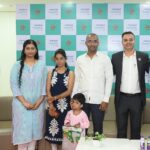Metropolis Healthcare Study:
- Over 51% of affected children were under age 3, pointing to the urgent need for early and prenatal screening
- Advanced Molecular Techniques, including Next-Generation Sequencing, enable early detection, precise diagnosis, and informed intervention for genetic blood disorders
India
healthysoch
New Delhi, May 22, 2025:
In its ongoing commitment to raising awareness of critical pediatric health concerns, Ameera Shah-led Metropolis Healthcare Limited—India’s second-largest and most respected diagnostic laboratory chain—has released the findings of a landmark study revealing the growing burden of inherited blood disorders among Indian children.
The study, conducted over a three-year period (2021–2024), screened nearly 20,000 children under the age of 12 who were clinically suspected of having hemoglobinopathies—a group of inherited blood disorders that affect red blood cells. Alarmingly, 28.4% of the children tested were found to have a hemoglobin disorder. These conditions can lead to serious health issues, including chronic anemia, fatigue, delayed growth and development, and increased vulnerability to infections.
Among the affected children, beta-thalassemia trait (38.7%) and sickle cell disease/trait (combined 30%) emerged as the most common conditions. Beta-thalassemia trait is a genetic condition in which the body produces fewer healthy red blood cells. While individuals may not show symptoms, there is a significant risk of passing the condition to offspring if both parents are carriers. In contrast, sickle cell disease causes red blood cells to become abnormally shaped, leading to complications such as pain, frequent infections, and chronic anemia. Alarmingly, over 51% of the affected children were under the age of three—emphasizing the urgent need for integrating prenatal testing, early screening, and genetic counselling into routine maternal and child healthcare.
The study also revealed notable regional variations, highlighting the need for targeted screening programs tailored to specific geographies. North-East India recorded the highest positivity rate at 48.44%, with a high concentration of conditions such as Hemoglobin E (HbE). Central India showed a greater burden of sickle cell disease at 37.36%, while South India reported a substantial overall prevalence of hemoglobinopathies at 34.09%. Beta-thalassemia trait was found to be widespread across Western and Northern India.
Dr. Smita Sudke, Chief of Laboratory, Pune & Rest of Maharashtra, Metropolis Healthcare and the author of the study said: "Our findings reveal an urgent public health concern around inherited blood disorders like beta-thalassemia and sickle cell disease. Early detection through prenatal and newborn screening can dramatically alter disease outcomes. By incorporating advanced molecular diagnostic tools such as Sanger sequencing, Gap-PCR, and Next-Generation Sequencing (NGS), we can ensure timely diagnosis, empower reproductive planning, and ease long-term health and economic burdens on families and the healthcare system. These insights make a strong case for integrating genetic screening and counseling into India’s maternal and child health initiatives.”
An earlier PAN India study conducted by Metropolis Healthcare, which involved 65,779 cases, further emphasized the critical role of molecular testing in diagnosing hemoglobinopathies. The study used advanced DNA sequencing to uncover rare types of hemoglobin and identify the most common beta thalassemia mutations found worldwide. Advances in genetic technology, especially Next-generation sequencing (NGS), have brought a major shift in how thalassemia is diagnosed and managed. This modern testing method can examine important genes (HBB, HBA1, and HBA2) in great detail to spot changes or mutations that traditional tests might miss. It can detect a wide range of genetic issues—from small changes in the DNA to larger missing or duplicated sections.
NGS is especially valuable in identifying rare or novel mutations, facilitating precise genotyping for carrier screening, prenatal diagnosis, and disease classification. Its high sensitivity and throughput make it a powerful tool for population screening programs and genetic counseling, ultimately contributing to better clinical decision-making and personalized patient care in thalassemia. Dr. Kirti Chadha, Chief Scientific and Innovation Officer at Metropolis Healthcare Limited, commented: "Molecular testing plays a pivotal role in diagnosing and managing complex blood disorders, particularly beta-thalassemia major and sickle cell disease. It helps decode unexplained symptoms like anemia or microcytosis and enables early detection—even before symptoms appear—making it indispensable for prenatal and newborn screening. At Metropolis, we are expanding our portfolio of high-impact genetic tests, including NGS to bring accurate, accessible, and affordable solutions to families across India. By leveraging the power of advanced diagnostics, we aim to enable timely interventions and drive better healthcare outcomes nationwide.”
With India contributing to nearly 25% of the global beta-thalassemia burden, these findings serve as a timely call to action for policymakers, healthcare professionals, and the broader medical community. Metropolis Healthcare remains committed to pioneering diagnostic excellence and supporting India fight against genetic blood disorders through innovation, accessibility, and education.






